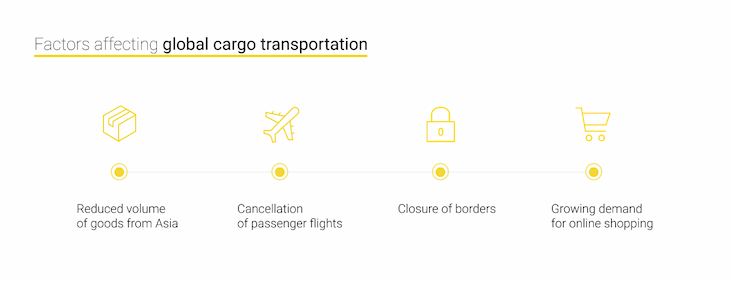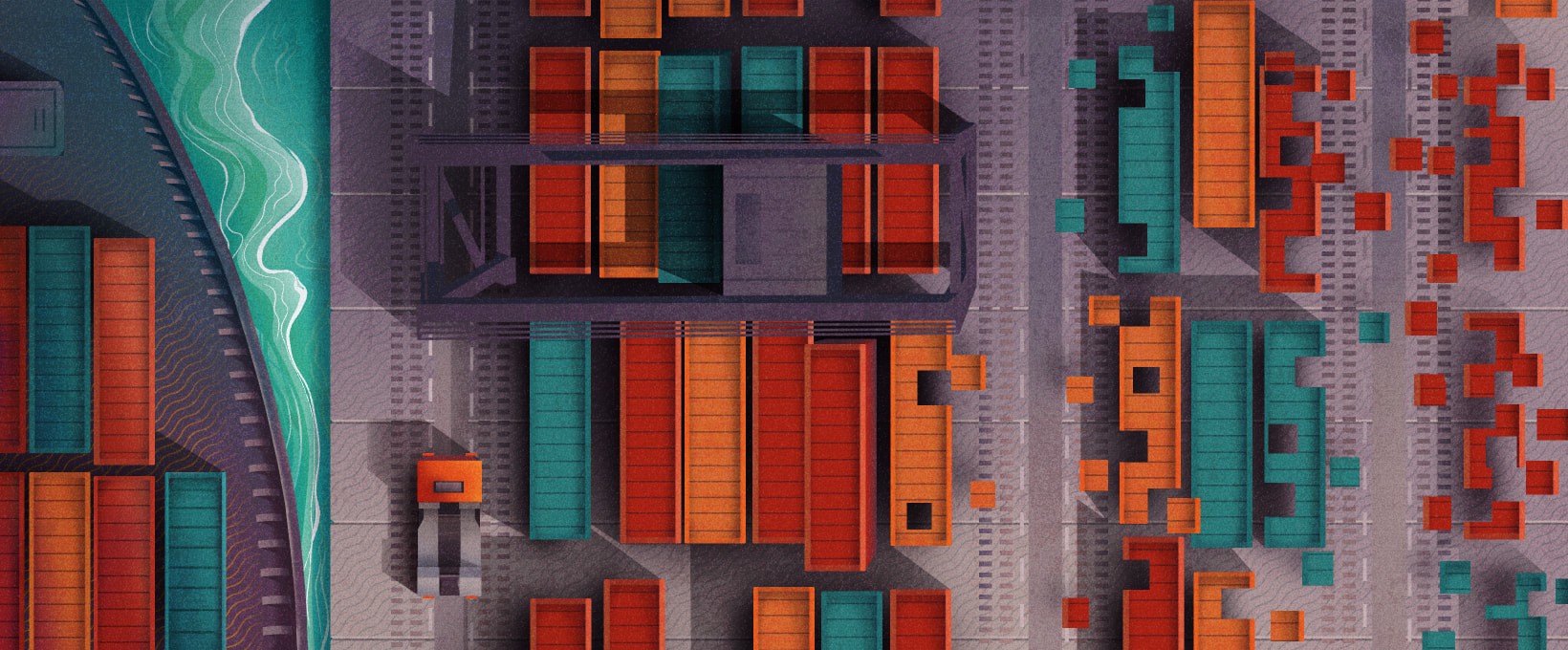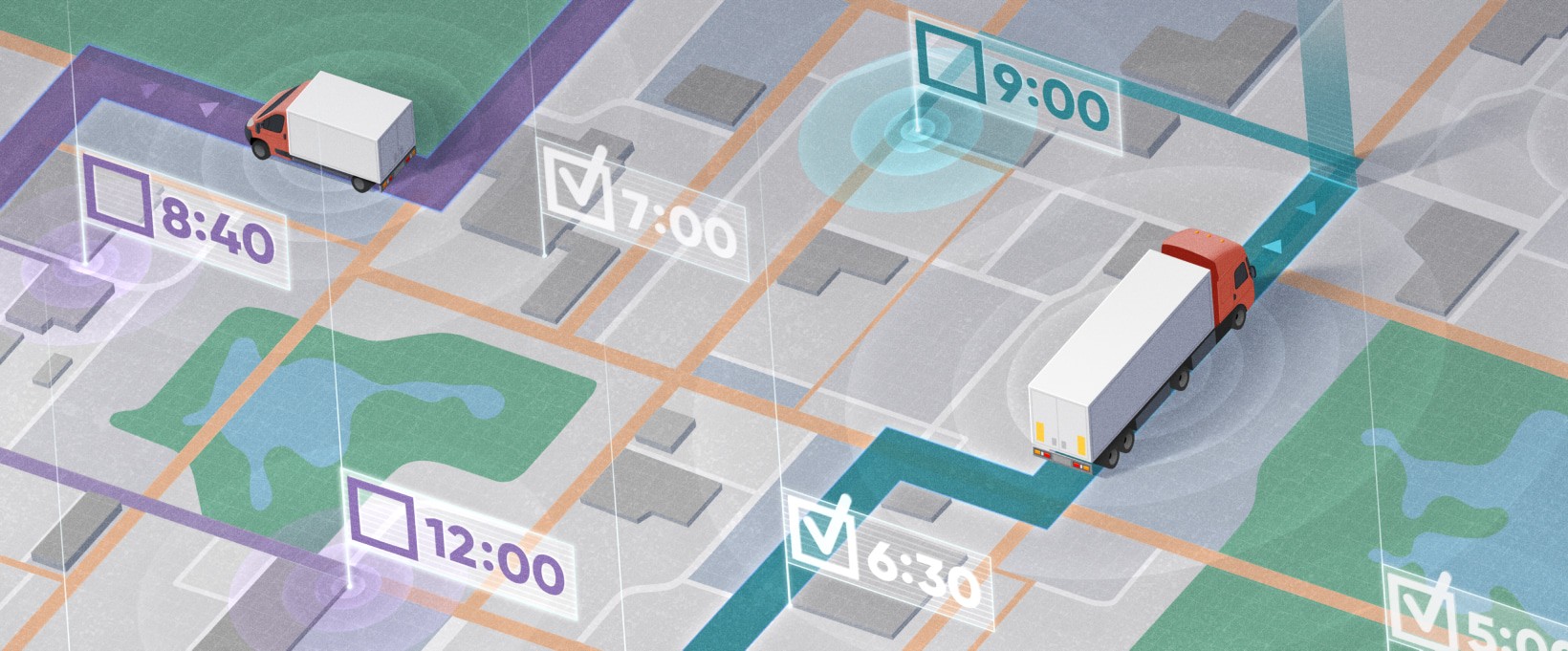- The virus’s attack on cargo transportation
- Topical issues during a pandemic
- How businesses cope with tasks
- Cloud technologies for cargo transportation
- Conclusion
The logistics industry plays an essential role in today's interconnected world: it connects millions of suppliers with their customers. However, since the beginning of 2020, most countries have been forced to close their borders and restrict traffic to avoid triggering another coronavirus outbreak. This created obstacles to international trade and spawned difficulties in supply chains for various cargos. What solution to this problem do major carriers offer? How can logistics management software and other IT products help? Let’s figure it out.
The virus’s attack on cargo transportation
The pandemic has affected almost every aspect of economic activity. Its impact was first felt in China, as this country plays a leading role in global manufacturing. Wuhan, the epicenter of the pandemic, is of particular importance - more than 200 firms from the Fortune Global 500 list are located there. The Celestial Empire is also a major consumer of world goods and agricultural products.
Manufacturing disruptions in China have had an adverse impact on global supply chains. Cargo stayed too long at the country's largest port, and travel restrictions led to a shortage of drivers. Carriers were obliged to obtain special permits for transporting goods across the province and had to prove that the recipients had an urgent need for the goods.
Supply restrictions in China have affected manufacturing operations around the world. And although by February 2020, the country's industrial sector had regained about 70% of its capacity, the decline in supply for its trading partners was substantive. According to the International Finance Corporation, within just one winter month, the volume of cargo from China decreased by more than 15%.
Here, however, it should be mentioned that in March 2020, logistics companies were able to restore the volume of supplies to 92% of the previous level. This rapid recovery is caused by not only the health system's ability to hinder the virus but also the government's specific policy regarding cargo. For example, the authorities canceled the road toll for trucks on national highways and quarantine requirements for drivers delivering essential goods.
Topical issues during a pandemic
The existing situation has had a profound effect on freight worldwide.

In the good old days, the conveyance of cargo by sea accounted for around 90% of the world's trade. The pandemic caused a decrease in the volume of manufacturing goods from Asia, and hence the demand for goods delivered by sea has fallen. Carriers reacted by canceling some trips.
Conversely, the throughput of air cargo has grown. This can be explained by the fact that airline companies were forced to cancel their passenger flights and, as a result, converted them for the transportation of goods.
Speaking about conveyance by road, the impact of the current situation on this area is ambiguous. On the one hand, the lack of drivers and border closures have led to long delays of goods. European states introduced restrictive measures that caused huge traffic jams. For example, in March, trucks lined up in a 48-kilometer queue at the Czech-Polish border.
On the other hand, the volume of cargo transportation was influenced by the trend towards the accelerated transition of consumers to online purchases. For example, in Italy, sales of consumer goods over the Internet grew by 81% within one week. This sharp spike increased the load on transport, which had already been high.
McKinsey predicts that 55% of Chinese consumers will continue to shop online even after the coronavirus crisis is over; for example, to buy cars without visiting showrooms. Therefore, companies with multi-channel inventory strategies are among the organizations that have successfully dealt with the crisis. They switched to the BOPIS (buy online pickup in store) models. Small businesses and restaurants have also converted their websites to points of sale and set up their own delivery services.
How businesses cope with tasks
The above-described approach - takeaway retail - poses some logistical hindrances. eCommerce requires fast order fulfillment and low-cost delivery to the consumer.
A possible solution is to open alternative storage facilities close to shipping points and transform stores into warehouses with distribution and order fulfillment centers. It is even possible to strategically use cargo ships as "floating storages" through careful timing of shipment. For example, the delivery time by sea from China will be 40-60 days.
Modern technologies are also coming to the aid of the retail and transportation industries. The technologies improve the efficiency of customer service, reduce transportation costs and increase the speed of cargo delivery.
For instance, portable mobile technologies in warehouses enable employees to complete orders in less time than when using traditional systems. This, in turn, helps brands make more informed decisions about what products to deliver to retail stores in order to meet customer needs faster. For example, the Scalefusion app allows carriers to monitor workplace safety, unify ways of communication between employees, and quickly resolve issues via remote access.
An integrated platform based on the Internet of Things (IoT) helps cargo companies reduce unnecessary service interruptions. Drivers and supply chain employees can receive real-time data on the location of goods. This gives specialists all the information they need to manage the delivery process.
Transporeon develops new technological solutions, even during the pandemic. The carrier has teamed up with Peripass to create an innovative logistics solution called Yard Enabler. It includes an application via which organizations can manage a cargo platform with real-time visibility of the situation. Fully automated technology helps shippers, retailers, carriers, and logistics providers make the best use of all the resources at their disposal. The product will be available in April 2021, and for now, it’s at the stage of testing on real sites.
Cloud technologies for cargo transportation
Supply chain disruptions inevitably affect the cost of cargo transportation and the quality of customer service. This was especially felt by carriers that, at the moment of the pandemic outbreak, didn’t use special software for logistics - the so-called transport management system (TMS). Such companies found it difficult to contact customers and update order status when delays occurred. And although only a third of respondents of SupplyChainBrain's survey used TMS in the spring of 2020, 51% of companies will aspire to implement such capabilities in the future.
TMS allows carriers to track orders in real time and automatically alerts employees in the event of an emergency. In addition, the use of this program increases the transparency of operations and allows organizations to efficiently allocate resources. The system even helped refining ventures optimize gasoline production by accessing real-time demand data.
For 68% of respondents in the above study, cost management was the main reason for implementing TMS. As the budgets of most logistics companies around the world have shrunk, their margins have declined, resulting in forced money-saving. For example, in 2020, 61% of the surveyed carriers planned to revise their delivery rates.
Logistics software development helps companies manage all stages of cargo transportation. Firms can promptly receive emergency reports and continuously improve the quality of their services. This, in turn, reduces carriers’ costs.
Conclusion
Over the past year, logistics companies have taken a big step forward. In order to stay competitive and improve their efficiency, they had to look for new ways of development. And the example of Transporeon has shown that this is possible if applying the latest technology.
Cloud data storages, mobile applications for order processing, logistics management software development, and many other innovations provide carriers with significant benefits. At the same time, innovative technologies help companies move to a new format of work, which is expected by technically advanced customers.







